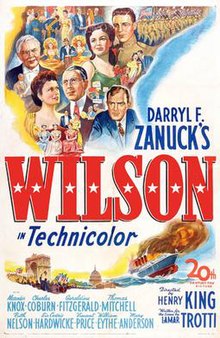Wilson (1944 film)
| Wilson | |
|---|---|

Film poster
|
|
| Directed by | Henry King |
| Produced by | Darryl F. Zanuck |
| Written by | Lamar Trotti |
| Starring |
Charles Coburn Alexander Knox Geraldine Fitzgerald Thomas Mitchell Sir Cedric Hardwicke |
| Music by | Alfred Newman |
| Cinematography | Leon Shamroy |
| Edited by | Barbara McLean |
| Distributed by | Twentieth Century-Fox |
|
Release date
|
|
|
Running time
|
154 minutes |
| Country | United States |
| Language | English |
| Budget | $2,995,000 |
| Box office | $2,000,000 (rentals) |
Wilson is a 1944 American biographical film in Technicolor about American President Woodrow Wilson. It stars Charles Coburn, Alexander Knox, Geraldine Fitzgerald, Thomas Mitchell and Sir Cedric Hardwicke.
The story begins in 1909, a time when Wilson (Alexander Knox) is best known as the head of Princeton University and the author of several books on the democratic process. Urged into running for Governor of New Jersey by the local political machine, Wilson soon proves that he is his own man, beholden to no one-and that he is dedicated to the truth at any cost.
The movie was written by Lamar Trotti and directed by Henry King. Wilson's daughter, Eleanor Wilson McAdoo, served as an informal counselor. Journalist Ray Stannard Baker, an authority on Wilson served as an adviser.
The film lost a reported $2 million for Fox.
Though the film was mostly critically acclaimed and won five Oscars (see below), it is also remembered for being a big financial failure at the box office.
Film critic Manny Farber was particularly unenthusiastic, calling the production "costly, tedious and impotent" while writing: "The effect of the movie is similar to the one produced by the sterile post-card albums you buy in railroad stations, which unfold like accordions and show you the points of interest in the city ... The producers must have known far more about the World War, the peace-making at Versailles, and Wilson himself, but that is kept out of the movie in the same way that slum sections are kept out of post-card albums ... About three-quarters of the way through, a large amount of actual newsreel from the first World War is run off and the strength of it makes the film that comes before and after seem comical."
...
Wikipedia
